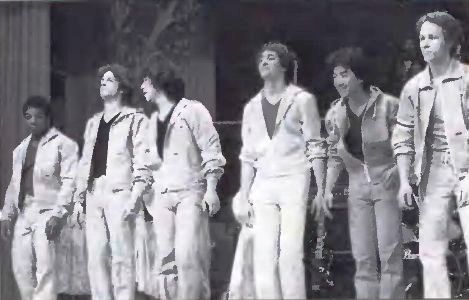![]()
The Words of Hyo Jin Moon
|
|
The Words of Hyo Jin Moon |

The newest rock ensemble in our church, led by Hyo Jin Nim Moon, made its debut on Parents' Day. When Hyo Jin Nim and the other members were trying to find a name to call themselves, they had unison prayer and then picked up the I Ching (Book of Changes). It opened to Hexagram 16, "Enthusiasm," identified by the Chinese character Yu. The I Ching is the oldest book in the world, and contains six-line symbols for 64 images representing all phenomena and all changes in the universe. Chinese philosophers would consult the I Ching to give a perspective on human affairs as they relate to heavenly matters, to politics, to one's social life, business or even marriage.
Hyo Jin Nim was very surprised and pleased, for this symbol has special significance concerning music as the means of uniting the spirit world and physical world. According to reports, Father also was inspired by the meaning of the word Yu as the name for their group. "Like the name says," Hyo Jin Nim told members at the celebration, "our music is for YOU."
The following commentaries come from the Cary F. Baynes English translation of the I Ching, originally translated from Chinese into German by Richard Wilhelm. This version is considered the most authoritative of all I Chings in either language.
Hexagram 16 is named "Enthusiasm," and is formed by the symbol for thunder (or movement) in a position of influence over the symbol for earth (receptivity). "'Chen' is the sound of the thunder that accompanies the movements of reawakening life.
This sound is the prototype of music. Furthermore, Chen is the trigram in which God comes forth, hence the idea of the Supreme Deity."
"The time of enthusiasm derives from the fact that there is at hand an eminent man who is in sympathy with the spirit of the people and acts in accord with it. Hence he finds universal and willing obedience. To arouse enthusiasm it is necessary for man to adjust himself and his ordinances to the character of those whom he has to lead. The inviolability of natural law rests on this principle of movement along the line of least resistance. These laws are not forces external to things but represent the harmony of movement immanent in them. That is why the celestial bodies do not deviate from their orbits and why all events in nature occur with fixed regularity. It is the same with human society; only such laws as are rooted in popular sentiment can be enforced, while laws violating this sentiment merely arouse resentment.
Again, it is enthusiasm that enables us to install helpers for the completion of an undertaking without fear of secret opposition. It is enthusiasm too that can unify mass movements, as in war, so that they achieve victory."
The Image
Thunder comes resounding out of the
earth:
The image of enthusiasm. Thus the ancient kings made
music
In order to honor merit, And offered it with splendor
To
the Supreme Deity, Inviting their ancestors to be present.
"When, at the beginning of summer, thunder -- electrical energy -- comes rushing forth from the earth again and the first thunderstorm refreshes nature, a prolonged state of tension is resolved. Joy and relief make themselves felt. So too, music has power to ease tension within the heart and to loosen the grip of obscure emotions. The enthusiasm of the heart expresses itself involuntarily in a burst of song, in dance and rhythmic movement of the body. From immemorial times the inspiring effect of the invisible sound that moves all hearts, and draws them together, has mystified mankind.
"Rulers have made use of this natural taste for music; they elevated and regulated it. Music was looked upon as something serious and holy, designed to purify the feelings of men. It fell to music to glorify the virtues of heroes and thus to construct a bridge to the world of the unseen. In the temple men drew near to God with music and pantomimes (out of this later the theater developed). Religious feeling for the Creator of the world was united with the most sacred of human feelings, that of reverence for the ancestors. The ancestors were invited to these divine services as guests of the Ruler of Heaven and as representatives of humanity in the higher regions. This uniting of the human past with the Divinity in solemn moments of religious inspiration established the bond between God and man. The ruler who revered the Divinity in revering his ancestors became thereby the Son of Heaven, in whom the heavenly and the earthly world met in mystical contact."